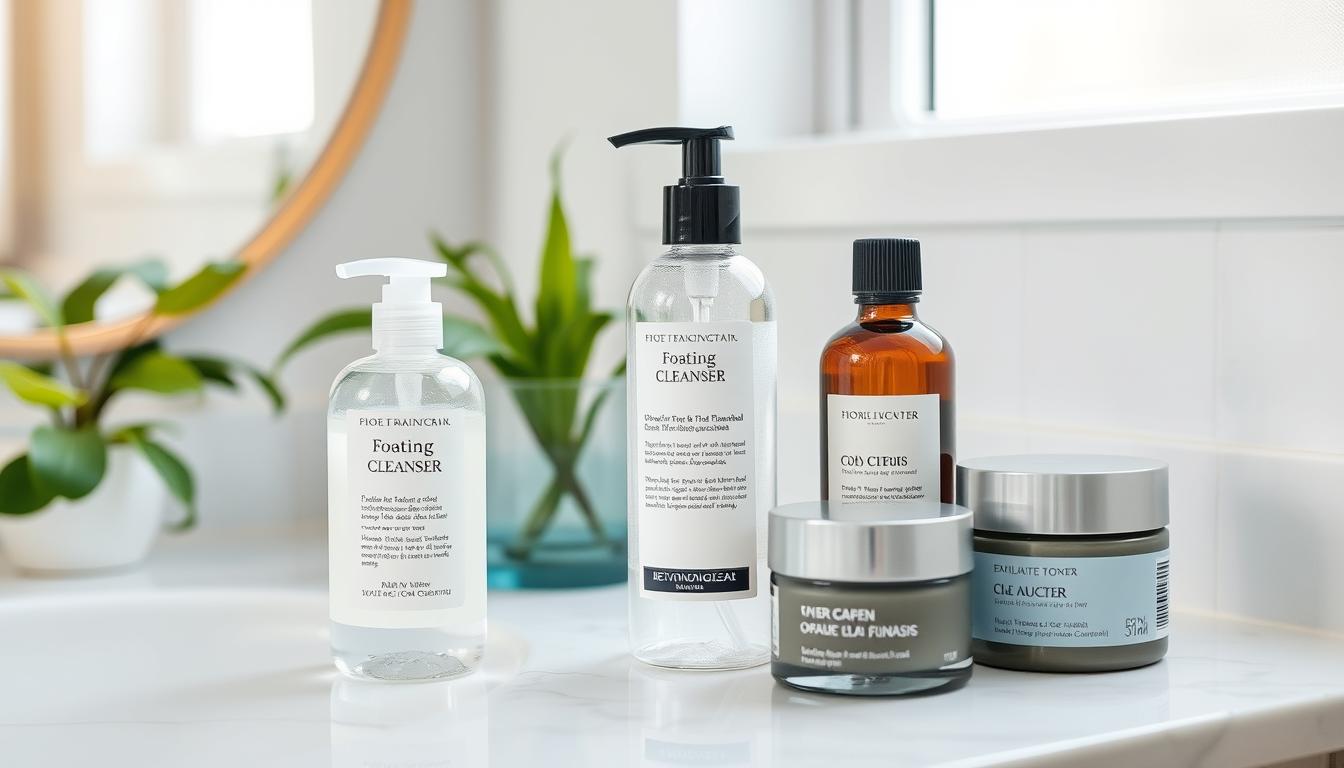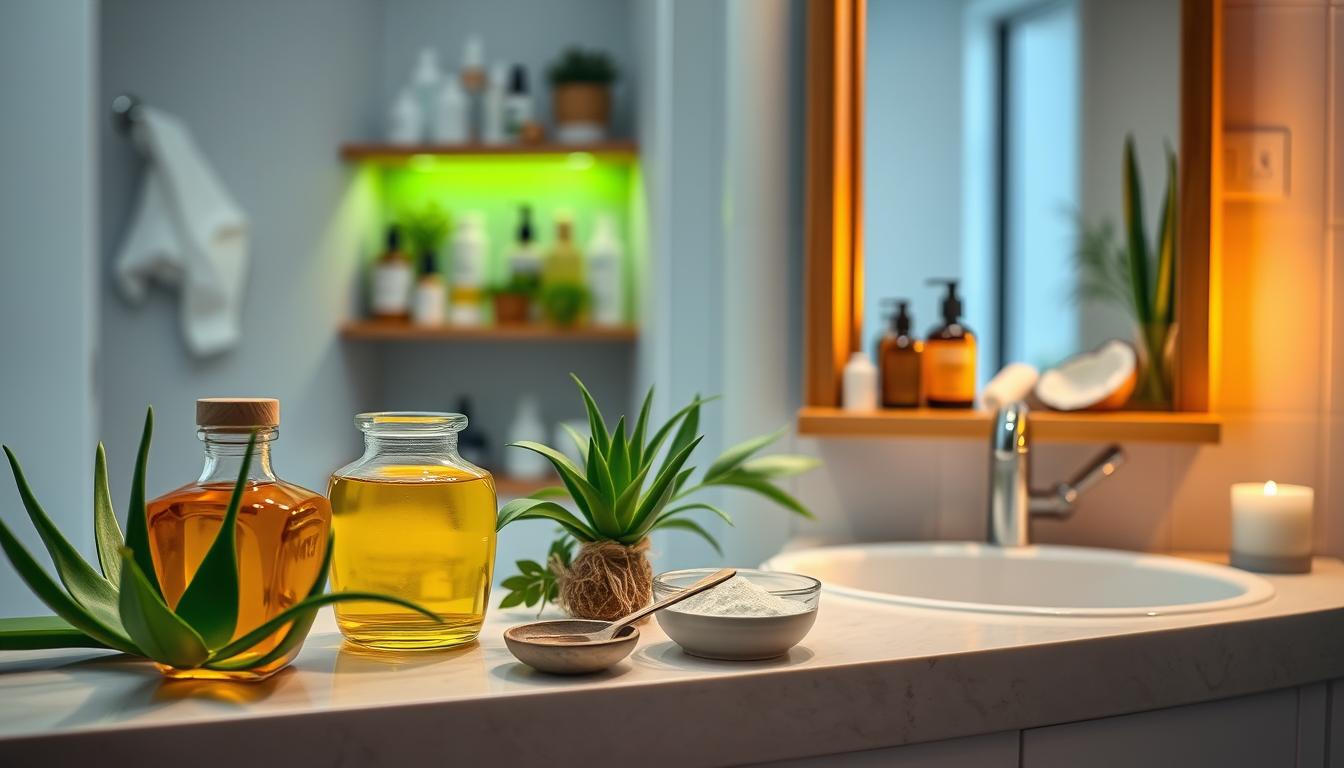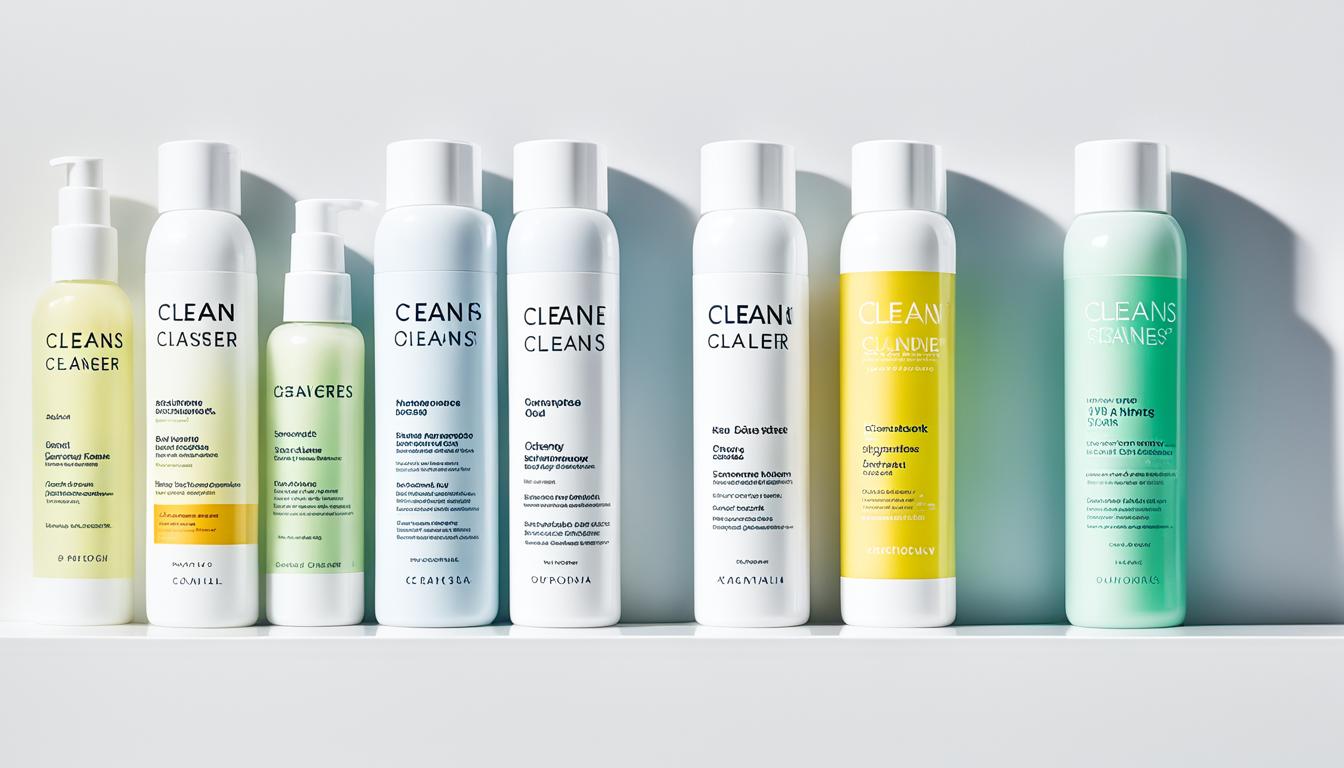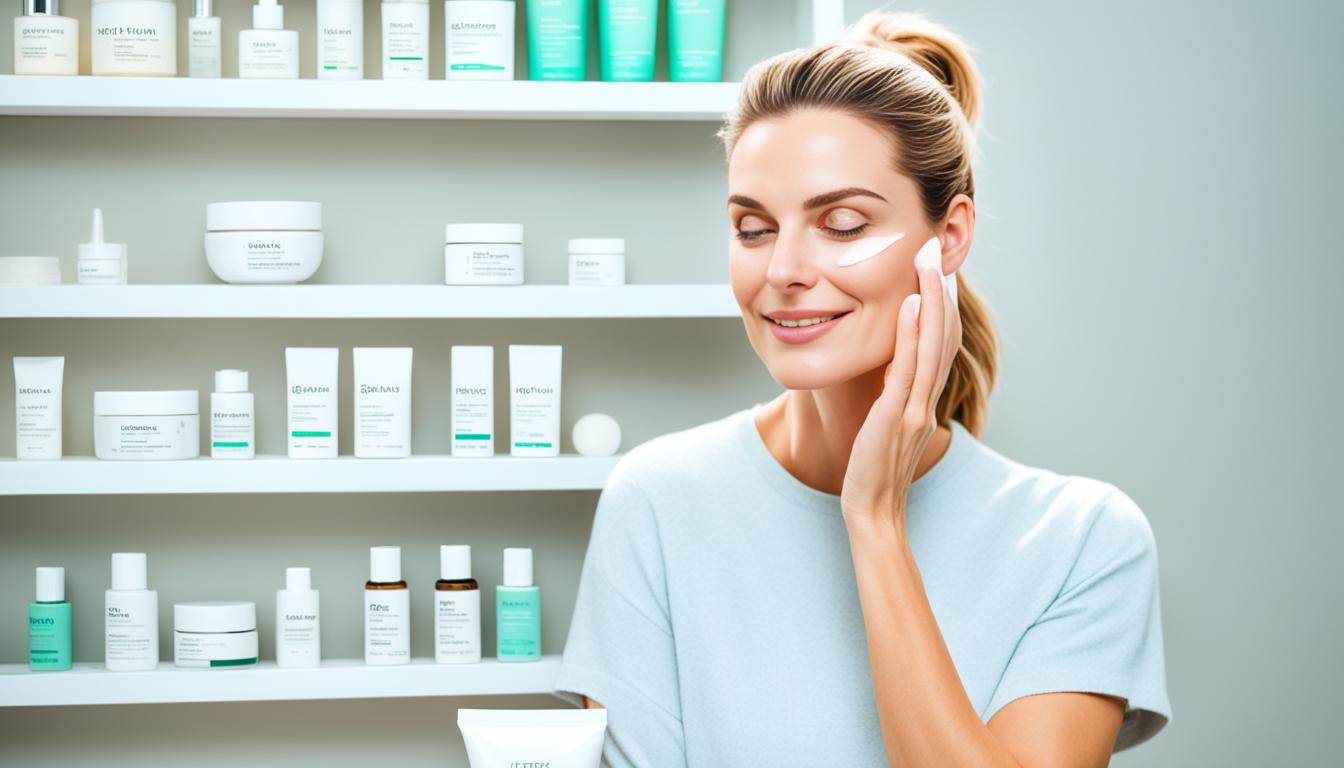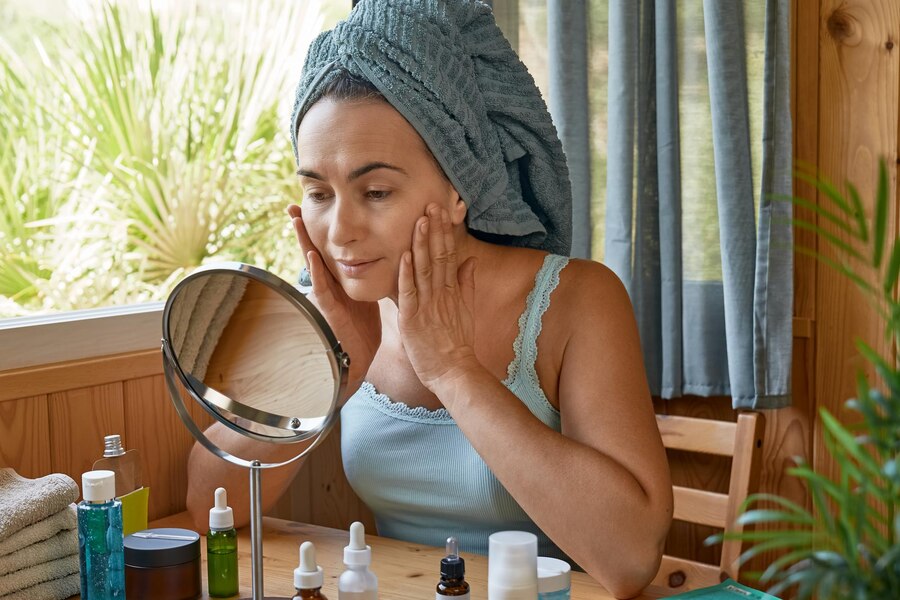What Fruits Are Good For Dry Skin?
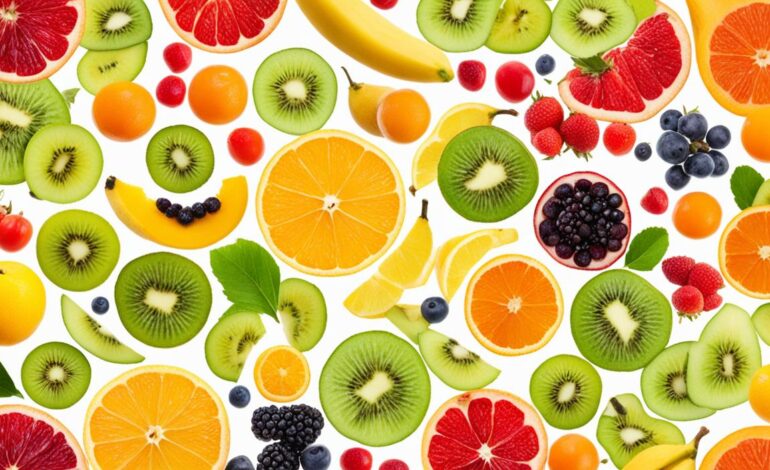
Keeping your skin healthy and hydrated is key to looking young and fresh. Dry skin comes from many causes like the environment, hormones, and the products we use. But what we eat plays a big role too. Adding fruits full of vitamins, minerals, and antioxidants can really help fight off dry skin and make it look brighter.
Things like oranges full of vitamin C and avocados with their healthy fats can do wonders for your skin. They make your skin shine and feel soft from within. Knowing which fruits help our skin can help us eat in a way that deals with our skin issues. This might be fighting acne, smoothing away wrinkles, or just wanting clear, glowing skin.
Key Takeaways
- Certain fruits are rich in essential vitamins, minerals, and antioxidants that can nourish and hydrate the skin.
- Incorporating skin-boosting fruits into your diet can help combat dryness, improve skin texture, and promote a radiant, youthful appearance.
- Different fruits target various skin concerns, from fighting acne to reducing fine lines and wrinkles.
- A balanced, nutrient-dense diet that includes a variety of skin-friendly fruits can support overall skin health and resilience.
- Exploring the unique benefits of different skin-boosting fruits can help individuals curate a personalized approach to addressing their specific skin needs.
The Importance of Proper Nutrition for Healthy Skin
Your skin stays healthy and strong thanks to the nutrients you eat. The skin acts like a shield, guarding you from bacteria, oxidants, and the sun’s UV light. Eating the right vitamins, minerals, and antioxidants is key. They help the skin stay hydrated, protect its barrier, and keep you well.
Also Read : Which Vegetable Is Best For Glowing Skin?
How Diet Affects Skin Health
Eating a balanced diet is crucial for your skin. Nutrients like vitamins A, C, D, and E, plus minerals such as zinc and selenium, are essential. They maintain the skin’s defenses, keep it hydrated, and help it look its best. Enjoying a wide range of nutritious foods makes your skin look and feel amazing.
Also Read : What Are The Best Natural Remedies For Eczema?
Nutrient Deficiencies and Dry Skin
But missing out on key nutrients can lead to skin problems. These might include dryness, irritation, and a weak barrier. Not getting enough of these nutrients can make your skin more sensitive. This can affect how your skin looks. Changing what you eat can make a big difference.
Also Read : What Are The Symptoms Of Skin Cancer?
| Nutrient | Deficiency Impact on Skin | Food Sources |
|---|---|---|
| Vitamin A | Dry, rough skin, increased susceptibility to infections | Beef liver, sweet potatoes, carrots |
| Vitamin C | Impaired collagen production, delayed wound healing, increased skin irritation | Sweet red peppers, kiwifruit, citrus fruits |
| Vitamin E | Increased skin sensitivity, reduced protection against oxidative stress | Sunflower seeds, almonds, avocados |
| Zinc | Impaired wound healing, decreased skin cell renewal, increased inflammation | Oysters, baked beans, cashews |
How you eat affects your skin health. Knowing this helps you choose foods that benefit your skin. Eating a variety of nutritious foods helps your skin stay strong, hydrated, and tough against daily challenges.
Also Read : What Is Rosacea And Its Symptoms?
Vitamin A-Rich Fruits for Dry Skin
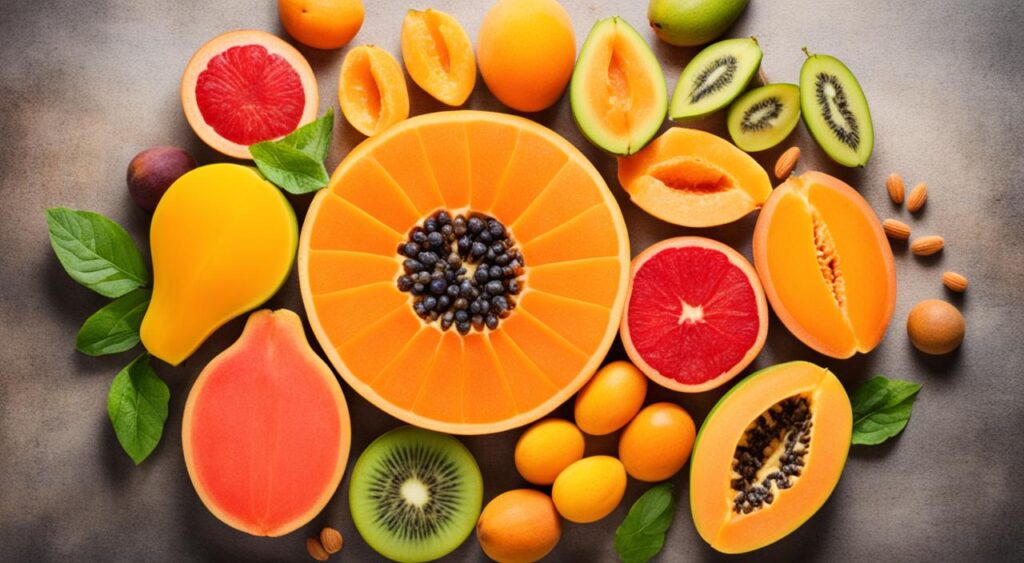
Getting that beautiful, glowing skin is tied to the right nutrients. Vitamin A is a star when it comes to keeping your skin healthy. It battles dry skin and boosts skin health overall. You can enjoy many tasty fruits to get this important vitamin into your diet.
Also Read : Discovering The Best PHD Scholarships For USA Students
Beef Liver and Sweet Potatoes: Excellent Sources of Vitamin A
Some foods are standouts for their vitamin A content. Beef liver leads the pack, with an amazing 6,582 mcg of vitamin A in a 3-ounce serving. That’s 731% of your daily needs! Sweet potatoes also shine, with a baked one giving you 1,403 mcg, which meets 156% of your daily vitamin A requirement.
It’s simple to add these foods to many dishes. Think about including them in stews, roasted veggies, stir-fries, and even baked goods. By including these powerhouses in your diet, your skin gets a great boost from the vitamin A.
Benefits of Vitamin A for Skin Health
Vitamin A does wonders for your skin, thanks to its retinoids and carotenoids. It steps up to restore skin that’s been damaged by the sun and can help with skin issues like psoriasis. Eating plenty of fruits and veggies rich in vitamin A is good for your skin. It helps protect it, keeps it healthy, and makes it shine.
If dry skin is a problem for you, more vitamin A in your diet might be the fix you need. Grab some beef liver and sweet potatoes, or enjoy a variety of vitamin A-packed fruits. There are so many delicious options to help your skin from within.
“Vitamin A is key for keeping your skin healthy and strong. It’s needed for cell growth, fixing damage, and preventing dryness and harm to your skin.”
Vitamin C-Rich Fruits for Hydrated Skin

To keep your skin healthy and hydrated, eating certain fruits is key. Vitamin C-rich fruits, like sweet red peppers and kiwifruit, are great for your skin. They help protect it from aging and damage.
Sweet Red Peppers and Kiwifruit: Packed with Vitamin C
A small amount of sweet red pepper is loaded with 95 mg of vitamin C. This is over 100% of what you need each day. Kiwifruit, on the other hand, provides a single medium-sized one with 64 mg. Both are amazing sources of vitamin C for your skin health.
How Vitamin C Boosts Skin Hydration and Protection
Vitamin C is crucial for keeping your skin hydrated and protected from the environment. It acts as a shield from UV rays and keeps moisture locked in. Vitamin C also boosts collagen production. This protein makes your skin look firm and young.
Eating fruits with lots of vitamin C helps fight skin aging. It reduces wrinkles, fixes uneven color, and makes your skin feel smoother.
Adding more vitamin C fruits to your diet is an easy way to take care of your skin. It helps your skin stay hydrated and protects it. This makes your face look bright and young.
The Role of Vitamin D in Combating Dry Skin
Healthy, hydrated skin needs more than just lotions. It depends on what we eat, too. Vitamin D is crucial for good skin. It helps fight dry skin issues and boosts the skin’s overall health.
Cod Liver Oil and Fortified Plant-Based Milks for Vitamin D
Cod liver oil is packed with vitamin D. Just one tablespoon gives 34 micrograms – 170% of what you need daily. For those who don’t eat animal products, fortified milks including soy, almond, and oat milk are great sources. They offer 2.5-3.6 mcg per serving, up to 18% of your daily needs.
Vitamin D3, in particular, tells our skin not to make too many keratinocytes. These cells can lead to dry, flaky skin challenges, such as psoriasis. Vitamin D also helps reduce inflammation and speeds up healing, key for a strong skin barrier.
Getting enough vitamin D from what you eat or through supplements is vital. It’s especially important for anyone dealing with dry, angry skin. Tackling a vitamin D shortage helps treat dry skin’s real causes. It also improves your skin’s ability to keep moisture in.
“Vitamin D is essential for maintaining a healthy skin barrier and reducing inflammation, which can be key factors in combating dry skin conditions.”
Fruits for Boosting Skin’s Antioxidant Defense
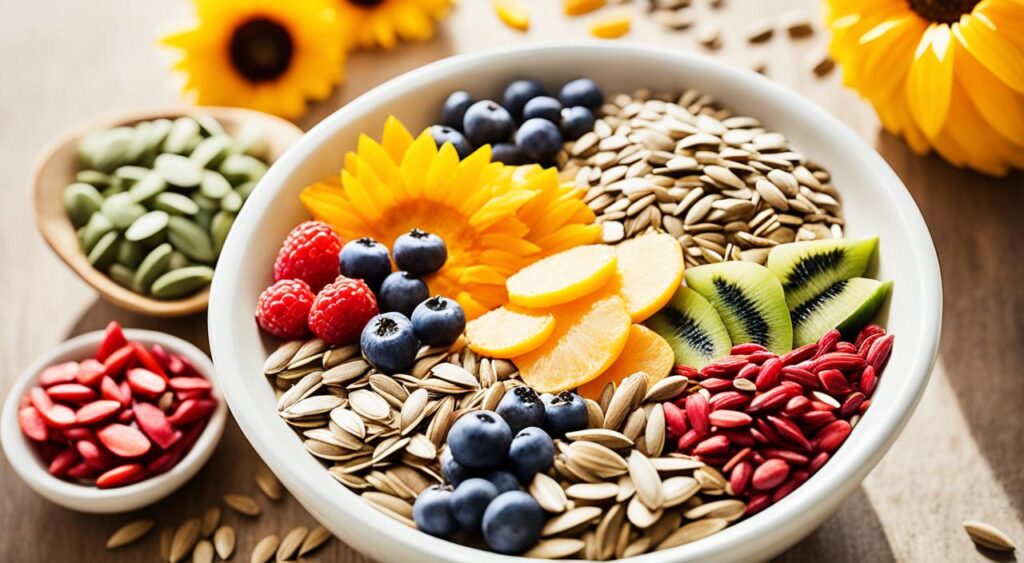
Keeping your skin looking great isn’t just about creams. The things we eat are super important too. Antioxidants, which are in lots of fruits, help prevent dry and aged skin.
Sunflower Seeds: A Potent Source of Vitamin E
Sunflower seeds are packed with vitamin E. This antioxidant is key for skin health. It fights UV damage, like dryness and pigmentation, by lowering inflammation and stopping free radicals. Just one ounce of these seeds gives you 7.4 mg of vitamin E, meeting 49% of your daily needs.
They also hold vitamin C and essential fatty acids. When you mix E and C, you lessen inflammation and redness, making your skin more resilient.
| Nutrient | Amount in 1 oz (28g) of Sunflower Seeds | % of Daily Value |
|---|---|---|
| Vitamin E | 7.4 mg | 49% |
| Vitamin C | 1.5 mg | 2% |
| Omega-6 Fatty Acids | 9.6 g | N/A |
Adding antioxidant-rich fruits like sunflower seeds to your meals strengthens your skin’s natural defenses. It fights against damage from the outside, making your skin glow.
“Antioxidants play a crucial role in protecting the skin from oxidative stress and environmental damage, which can contribute to dry, aging skin.”
Zinc-Rich Fruits for Skin Protection
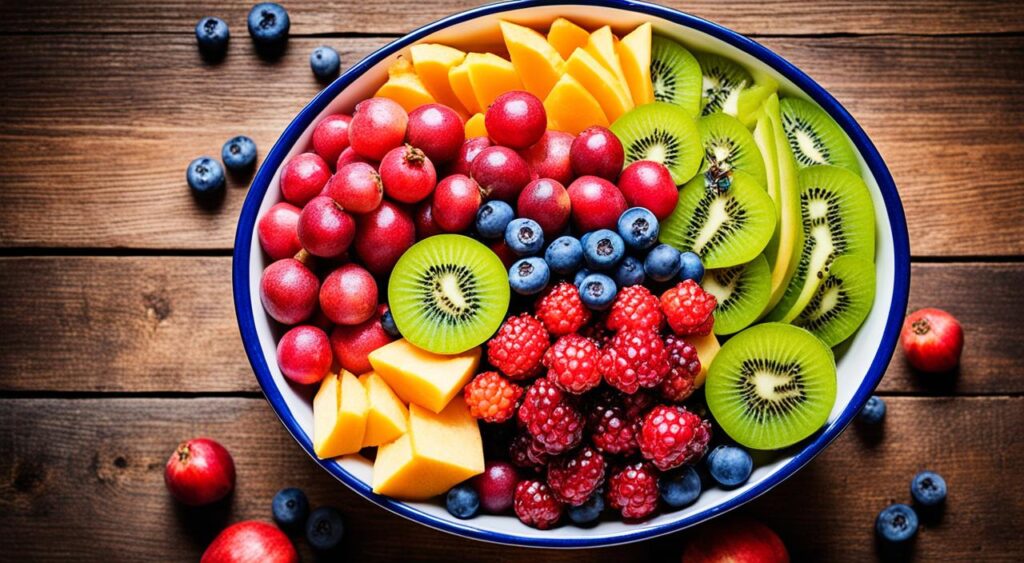
Zinc is vital for healthy skin. It stops harmful rays from the sun and keeps skin from drying out. It’s also great at fighting off bacteria. So, it’s good for keeping acne away when you eat it with Vitamin C.
Oysters and Baked Beans: Excellent Sources of Zinc
Oysters and baked beans are full of zinc. Zinc helps your skin protect itself and stay strong. A small serving of oysters has way more than your daily need of zinc. Canned beans have a good amount too.
Benefits of Zinc for Skin Health
- Supports the skin in holding moisture, preventing dryness
- Reduces itchiness and redness in the skin
- Helps cuts heal faster
- Lessens the chance of getting acne
- Guards against skin damage from the sun
Eating fruits and veggies high in zinc can do wonders for your skin. It keeps your skin healthy, hydrated, and strong. That’s why it’s so important to get enough zinc in your diet.
“Zinc is essential for maintaining skin health. Not getting enough can cause dryness, slow healing, and more infections.”
| Food Source | Zinc Content (per serving) | Percentage of Daily Value |
|---|---|---|
| Oysters (3 oz, breaded and fried) | 74 mg | 673% |
| Baked Beans (1/2 cup, canned) | 2.9 mg | 26% |
| Beef liver (3 oz, cooked) | 7 mg | 64% |
| Cashews (1 oz, dry roasted) | 1.6 mg | 15% |
Selenium-Rich Fruits for UV Protection
Blocking the sun’s harmful rays is important for healthy skin. Selenium is a key player here. It’s an antioxidant that boosts our skin’s natural defense. By doing so, it fights off damage and swelling caused by the sun.
Yellowfin tuna stands out as a wonderful source of selenium. Eating just 3 ounces of it gives you a big dose, 167% of what you need daily. With this, yellowfin tuna becomes a top choice to defend your skin from UV harm.
The Skin-Protecting Benefits of Selenium
Selenium does more than help against UV rays. It benefits conditions like psoriasis by lifting up glutathione peroxidase. This enzyme lowers oxidative harm and reduces swelling, preventing skin troubles.
Studies point to selenium help against dry skin and UV damage. Eating foods rich in selenium, like yellowfin tuna, can really boost your skin’s protection.
“Selenium is a powerful ally in the fight against UV-induced skin damage. By boosting antioxidant defenses, this essential mineral can help shield the skin and promote a healthier, more youthful appearance.”
Fruits Containing Omega-3 Fatty Acids for Skin Hydration
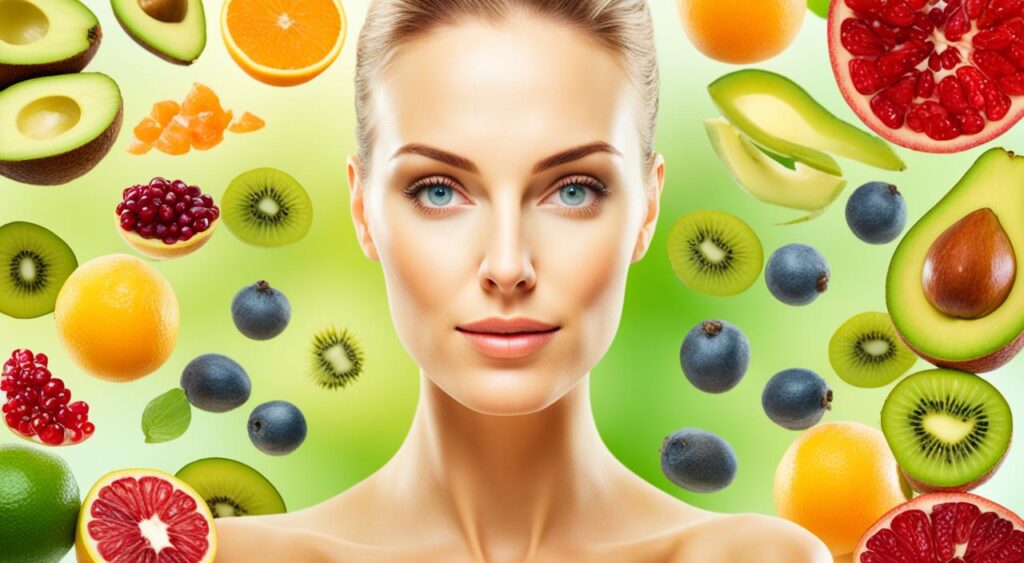
Keeping our skin healthy and hydrated is very important. What we eat matters a lot. Omega-3 fatty acids are a key nutrient for our skin. They don’t just help our health overall but also make our skin look and work better.
Not getting enough omega-3s might lead to dry, scaly skin or worse, dermatitis. But, including omega-3 foods in your meals can make your skin stronger, keep it better hydrated, and fight off dry skin issues.
Avocados, for example, are a great source of omega-3s. In a study done with rats in 2015, eating avocado-based omega-3 supplements for 60 days made their skin itch less and feel more hydrated. So, adding avocados and other omega-3 fruits to what you eat can really help your skin.
Aside from avocados, you can also get omega-3s from walnuts, flaxseeds, and chia seeds. Adding these foods to your daily meals can make your skin better able to keep moisture, more hydrated, and healthier overall.
“Omega-3 fatty acids are essential for maintaining skin health and hydration. A diet low in omega-3s can contribute to dry, scaly skin and dermatitis.”
By changing your diet to include more omega-3 fruits, you’re taking steps to improve your skin. Making omega-3s a priority in the food you eat is a smart, natural way to keep your skin looking and feeling great.
The Benefits of Green Tea and Turmeric for Dry Skin
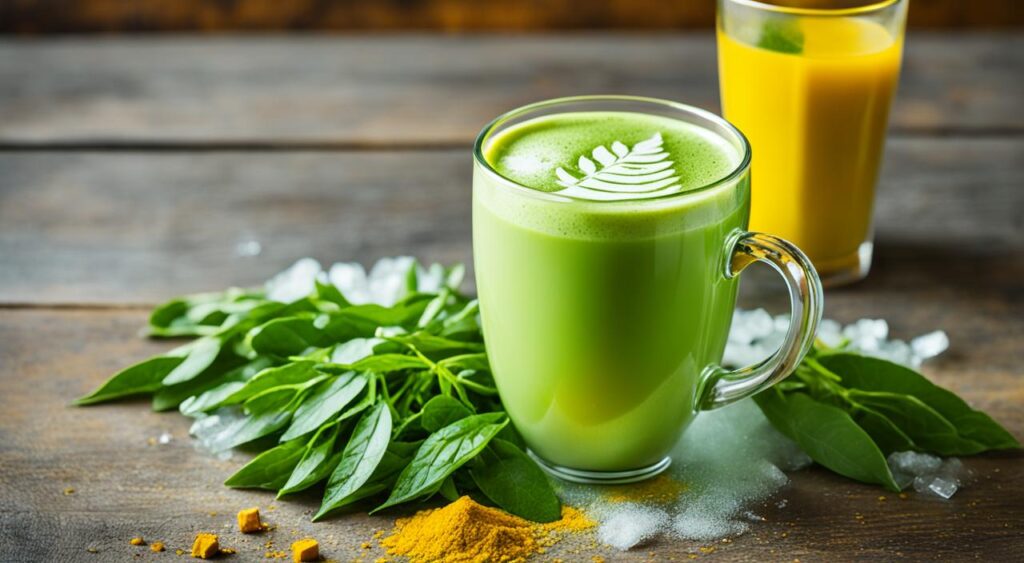
Green tea and turmeric aren’t just tasty; they’re a big boost for dry skin. They’re packed with antioxidants and anti-inflammatory troops. These help fight the skin’s aging signs and heal dry skin problems.
Green tea tops the chart for its EGCG antioxidants. They shield skin from UV harm, stopping early wrinkles and spots. Drink or apply green tea for silkier, less dry skin.
The star in turmeric, curcumin, fights inflammation well. It tackles redness, swelling, and irritation from dry skin issues. Plus, using it topically fights off acne bacteria, for better-looking skin.
By eating antioxidant and anti-inflammatory foods like green tea and turmeric, your skin gets amazing support. They join forces to fight aging signs, beat dryness, and give you a glowing look.
| Ingredient | Key Benefits for Dry Skin |
|---|---|
| Green Tea |
|
| Turmeric |
|
“Incorporating green tea, turmeric, and other antioxidant-rich foods into your diet can provide comprehensive support for dry, compromised skin.”
The Synergistic Benefits of Green Tea and Turmeric
Green tea and turmeric team up for unbeatable dry skin care. Green tea safeguards skin from the world, turmeric eases off redness and irritation. Blending these forces restores your skin’s barrier, boosts moisture, and gives you a vibrant skin tone.
Also read: 10 Foods To Add To Your Diet For A Healthy Glow
Conclusion
In conclusion, it’s a great idea to eat lots of different fruits for dry skin. These include skin-nourishing fruits, skin-hydrating fruits, and skin-protecting fruits. Also, antioxidant fruits, vitamin-rich fruits, and mineral-rich fruits help a lot. By eating these, you give your skin what it needs to stay healthy.
Fruits full of vitamins A, C, D, and E, plus zinc and selenium, boost the skin. They make it look and work better. Adding omega-3 from fruits and plant foods like green tea and turmeric is also a win. It helps fight off inflammation and harm from the world around us.
Eating the right fruits and foods can really make your skin glow. It makes you look healthier and more beautiful. Including plenty of skin-hydrating fruits and skin-protecting fruits in your diet is easy. It’s a great way to fight dry skin and keep your skin in top shape.
FAQs
What are the best fruits for dry skin?
Fruits rich in vitamins A, C, D, and E work wonders for dry skin. They also provide zinc and selenium. Think apples, oranges, and avocados among others.
How does diet affect skin health?
A healthy diet keeps your skin glowing. It helps maintain the skin’s protective layer, keeping it hydrated and strong. Without the right nutrients, your skin might become dry and weak.
What are the benefits of vitamin A for skin health?
Vitamin A is great for fixing sun damage and easing conditions like psoriasis. Foods like beef liver and sweet potatoes are packed with this beneficial vitamin.
How does vitamin C benefit the skin?
Vitamin C boosts skin moisture, fights UV damage, and increases collagen. This can make your skin look younger. You can get vitamin C from foods like sweet red peppers and kiwi.
What is the role of vitamin D in combating dry skin?
Vitamin D3 can help fight skin dryness and conditions like psoriasis. It has healing and anti-inflammatory effects. Good sources of vitamin D include cod liver oil and plant-based milks.
How do antioxidants from fruits help protect the skin?
Vitamin E, found in sunflower seeds, fights UV damage and pigmentation. Adding vitamin C to your diet can decrease skin inflammation. This combo helps keep your skin looking its best.
What are the benefits of zinc-rich fruits for skin health?
Zinc helps shield your skin from harmful rays and can prevent dryness. It works against bacteria and can help with acne. Good zinc sources are oysters and baked beans.
How does selenium from fruits support skin protection?
Selenium boosts your skin’s defense against the sun and is helpful for conditions like psoriasis. Yellowfin tuna is a top source of selenium.
What are the skin benefits of omega-3 fatty acids from fruits?
Avocados, with their omega-3s, support your skin’s health. They make the protective barrier stronger, keep it hydrated, and relieve dry skin.
How can green tea and turmeric help with dry skin?
Green tea’s antioxidants fight photo-aging for smoother, more hydrated skin. Turmeric’s curcumin is anti-inflammatory and can ease dry skin problems like psoriasis and dermatitis.

